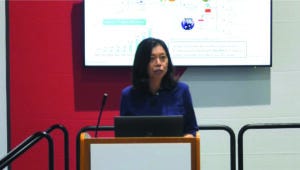- Sponsored Content
How a Robust, Fully Integrated, and Highly Vetted Cell-Line Development Platform Accelerates IND Timelines
August 24, 2022
Sponsored by WuXi Biologics
 Sherry Gu, senior vice president of CMC management, WuXi Biologics.
Sherry Gu, senior vice president of CMC management, WuXi Biologics.
Since 2020, WuXi Biologics has supported process development and manufacturing for more than 30 biopharmaceuticals associated with COVID-19. Those include three authorized/marketed products and multiple advanced clinical candidates representing modalities such as monoclonal antibodies (MAbs) and vaccines. Gu explained how her company’s integrated platform for cell-line development (CLD) has enabled customers to advance their programs rapidly.
The company’s custom protein-generation services support research and development (R&D) activities, culminating in developability assessment. Customers requiring mammalian-cell protein production can insert genes of interest into WuXian Transient or WuXian Express (WE) expression technologies. The former option generates titers of 0.3–2.0 g/L and requires less than two weeks for developability experiments. The WE system takes four to six weeks for such studies, yields titers of 3.5 g/L, and generates material that closely represents what can be produced at large scales.
The WuXia CLD platform leverages robust cell lines and advanced computational tools to facilitate clone selection. Using data from customer programs, Gu demonstrated how her company applies artificial intelligence to optimize codons. Cell lines resulting from the WuXia process have exhibited high productivity, good genetic stability, consistent glycan profiles, and diminished levels of aggregates and sequence variants. Gu explained that such features are hallmarks of lines that express high-quality proteins. She said that establishing quality early in process development helps significantly as a product advances through clinical studies. The WuXia CLD process takes between nine and 10 weeks from receipt of DNA to production of a master cell bank. On average, proteins are generated at titers of 6 g/L, although that value can be increased during culture optimization.
Gu showed that WuXi Biologics has accelerated CLD considerably by applying lessons learned during the COVID-19 pandemic. When possible, the company now conducts CLD activities in parallel. For instance, instead of waiting for complete results from preliminary clone screening, the company now advances 10 highly productive clones halfway through testing to jump-start cell-line stability assessment and bioreactor evaluation.
Whereas WuXi Biologics once waited until final clone selection to manufacture drug substance for toxicology studies, Gu continued, it now produces such material during clone screening using stable pools based on a promising clone. Thus, it takes only two months rather than six to nine months for toxicology material. After that has been tested, the same stable pools are used to produce good manufacturing practice (GMP)-grade material for investigational new drug (IND)-enabling studies. Complete results from clone screening are used to optimize a clone for subsequent manufacturing. By leveraging stable-pool material, WuXi Biologics now can help customers reach IND filing in as few as three months rather than a full year.
Next-generation sequencing (NGS) has enhanced the WuXia CLD platform significantly, Gu said. Such technology provides a high-resolution solution for plasmid confirmation, adventitious-virus detection, sequence-variant screening, and integration-site analysis. NGS also returns results rapidly. For instance, viral testing that once took eight weeks now takes 10 days. Gu added that automated minibioreactor and shake-flask systems have increased her company’s throughput.
Gu concluded by chronicling the journey of a customer that approached WuXi Biologics in March 2020 to manufacture a neutralizing antibody (NAb) therapy for SARS-CoV-2. Gu’s company helped the customer to identify a promising clonal cell line and scale manufacturing to 2,000-L batches by the following June. The customer received IND approval in July. Commercial-scale runs (12,000 L) were performed soon after, and the manufacturing process was qualified early in 2021. The product received emergency use authorization (EUA) in May 2021, just 18 months after DNA transfection.
Since that project, WuXi Biologics has manufactured more than 48 commercial batches of that product, and it is producing material for more than 33 SARS-CoV-2 NAb products and clinical candidates. Bioreactor titers for those antibodies have averaged 5 g/L, and time to IND filing has ranged from two and a half months to six months. Gu highlighted that WuXi Biologics can leverage a comprehensive global network to provide similar support for multiple modalities.
Fill out the form below to view the full BPI Theater presentation.
You May Also Like





